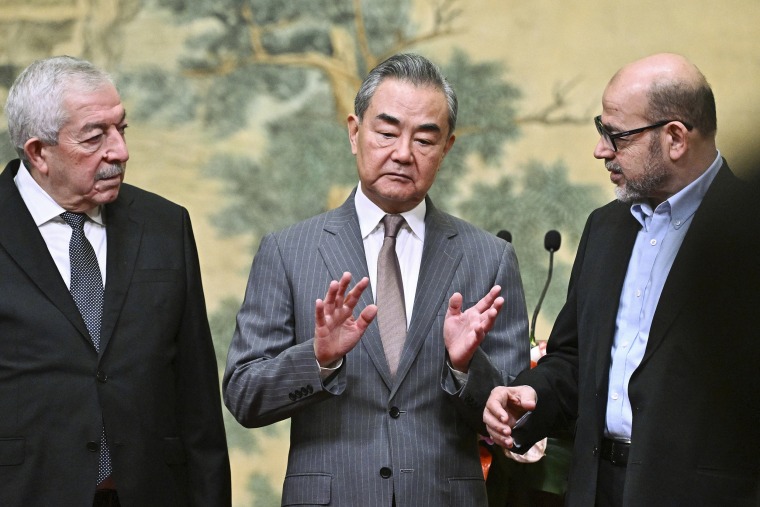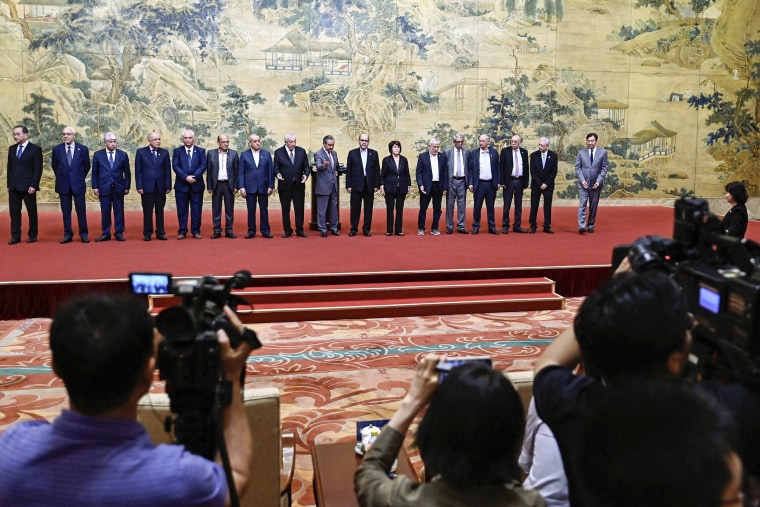BEIJING — Senior representatives from Palestinian factions Hamas and Fatah signed a joint declaration in China’s capital Beijing on Tuesday aimed at building unity and ending a decades-long rift as the fighting with Israel in Gaza rumbles on.
The agreement, called the “Beijing Declaration to End the Division and Strengthen Palestinian National Unity”, was announced at the end of three days of meetings here and was hailed today as a breakthrough by China’s Foreign Minister, Wang Yi, who called it “a historic moment for the cause of Palestine’s liberation.”
The deal also highlights China’s ambitions to be a more significant diplomatic player in the Middle East and a rival to the United States as a broker on the global stage. It comes just over a year after China helped broker an agreement between Iran and Saudi Arabia that saw them restore diplomatic relations after years of soaring tensions between the Middle Eastern powerhouses, unnerving many in Washington.

The eight-point declaration states that both sides will agree to the “formation of a temporary national unity government by agreement of the Palestinian factions,” according to a copy of the document seen by NBC News.
It adds that “the formed government shall exercise its powers and jurisdictions over all Palestinian territories, affirming the unity of the West Bank, Jerusalem and the Gaza Strip, with the government starting the unification of all Palestinian institutions in the territories and the preparation for holding general elections.”
The signatories have also agreed to “resist and thwart attempts to displace our people” from the Gaza Strip, the West Bank and Jerusalem “and affirm the illegality of settlement and settlement expansion in accordance with the resolutions of the U.N. Security Council, the U.N. General Assembly, and the opinion of the International Court of Justice.”
A Palestinian official familiar with the declaration told NBC News, “the implementation on the ground” is what matters now.
“The preferred way out for Hamas would be to embed itself in some post-partisan Palestinian governance structure,” Jon Alterman, the director of the Middle East program at the Washington based Center for Strategic and International Studies think tank, told NBC News on the eve of Palestinian talks.

“Whether it’s going to be acceptable to others — the United States, Israel, Europe — I don’t know,” he added.
President Joe Biden’s administration has proposed a plan that would ultimately lead to a permanent cease-fire in the Gaza Strip, as well as the release of all hostages and major post-war reconstruction. It also envisions a revamped Palestinian Authority to rule Gaza once the conflict ends. Israel rejected that idea, but has not put forward a credible alternative for how Gaza will be governed and by who.
China is not directly involved in the U.S.-led efforts between Israel and Hamas toward a cease-fire in the Gaza Strip, but is looking to stake out a role in post-war reconstruction. China has also made no secret of its desire to hold an international peace conference, and hosting Palestinian unity talks is seen as a diplomatic step toward that.
“There is nothing to lose (for China) by hosting such an event,” Fariz Mehdawi, the Palestinian Authority’s ambassador to China, said in a recent interview with NBC News in Beijing, “In diplomacy either you do some good political moves, or it will be considered a failure for you.”
After a first round of meetings in April ended with little progress, China waited until the participants had left the country before it announced the talks had taken place. A second round planned last month was scrapped after Hamas and Fatah pulled out at the last minute.
Power struggles have long split Fatah and Hamas, a divide that deepened in 2007 with Hamas’ violent takeover of the Gaza Strip following elections the year before.
The rupture has since left the Fatah-dominated Palestinian Authority, governing only parts of the occupied West Bank and increasingly criticized as having eroding legitimacy, according to studies by Palestinian Center for Policy and Survey Research. Israel has exercised power over both the West Bank and Gaza in different ways.
The bitter divisions and the West’s refusal to accept any government that includes Hamas unless it expressly recognizes Israel has thwarted repeated attempts at healing the rift.
“The historical divide between Hamas and Fatah is deep, with years of hostility and ideological differences,” said Maria Papageorgiou, a lecturer in politics and international relations at the University of Exeter in the U.K.
She added that successfully mediating between the different factions would be “a major diplomatic win” for China.
Mehdawi, the Palestinian ambassador, said Beijing “cannot call for a peace conference where the Palestinians themselves are not fixing their home.”
The outcome of the agreement would see Hamas come under the umbrella of the Fatah-dominated Palestinian Liberation Organization, and for the PLO to be “the sole legitimate representative of all Palestinian people,” said Wang Yi, according to Chinese state media.
China has “a strong national interest in being at the grownups table for international diplomacy,” said Alterman.
“China wants to be a part of whatever grand diplomatic jamboree ends this conflict and it would like to be a prominent part of that,” he added.

Post a Comment